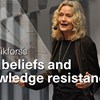belie
Belief Revision for Growing Awareness
Mind 130(520), 2021 Abstract The Bayesian maxim for rational learning could be described asconservative changefrom one probabilistic belief orcredencefunction to another in response to new information. ). But can this conservative-change maxim be extended to revising one’s credences in response to entertaining propositions or concepts of which one was previously unaware? The economists,) make a proposal in this spirit. Philosophers have adopted effectively the same rule: revision in response to growing awareness should not affect the relative probabilities of propositions in one’s ‘old’ epistemic state. The rule is compelling, but only under the assumptions that its advocates introduce. It is not a general requirement of rationality, or so we argue. We provide informal counterexamples. And we show that, when awareness grows, the boundary between one’s ‘old’ and ‘new’ epistemic commitments is blurred. Accordingly, there is no general notion of conservative change in this setting.
Expert deference as a belief revision schema
in Synthese (2020) AbstractWhen an agent learns of an expert’s credence in a proposition about which they are an expert, the agent should defer to the expert and adopt that credence as their own. This

Implicit Mind: Belief, Alief and Experience with Kathrin Glüer
Recording from the Implicit Mind Workshop at the Institute for Futures Studies in Stockholm, May 2015.
Daniel Cohnitz: Trust no one? The (social) epistemological consequences of belief in conspiracy theories
Daniel Cohnitz, Professor of Theoretical Philosophy, Utrecht University. Abstract Conspiracy theorists are typically skeptical about the trustworthiness of central governmental institutions. Some philos
Self-Driving Vehicles — an Ethical Overview
Philosophy & Technology 34: 1383–1408 Abstract The introduction of self-driving vehicles gives rise to a large number of ethical issues that go beyond the common, extremely narrow, focus on improbabl
Robert Goodin: Wisdom of the Multitude? Trump? Brexit?
Robert Goodin, Research Professor of Philosophy at Australian National University. Robert Goodin's research focuses on political theory and public policy. Read more about Robert Goodin ABSTRACT According
On the ratio challenge for Comparativism
Australasian Journal of Philosophy, p. 1-11. Abstract This paper discusses a challenge for comparativists about belief, who hold that numerical degree of belief (in particular, subjective probability) i
What Is ‘Real’ in Probabilism?
Australasian Journal of Philosophy, Pages 1-15, Received 11 Dec 2015, Published online: 04 Sep 2016 Abstract This paper defends two related claims about belief: first, the claim that, unlike numerical d
Disagreement, Indirect Defeat, and Higher-Order Evidence
in Klenk, M. (ed.), Higher Order Evidence and Moral Epistemology, London: Routledge, 2020. (ISBN: 0367343207) AbstractSome philosophers question whether higher-order evidence can support the radical sk

Åsa Wikforss: Bad Beliefs and Knowledge Resistance
Research seminar with Åsa Wikforss, professor of theoretical philosophy at Stockholm University and member of the Swedish Academy. Her research involves topics such as the philosophy of language, the








